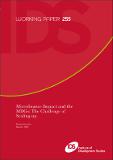| dc.description.abstract | This paper concerns the potential for microfinance to make a difference in achievement of the
Millennium Development Goals. It recognises that microfinance can contribute to several MDGs but
that to do so in ways that make a real difference would involve a significant scaling-up of microfinance
service provision. Herein lies the challenge. The expansion of developing country microfinance services is
increasingly driven by commercial investors who do not usually assess Microfinance Institution (MFI) performance
according to MDG criteria. At best, they will use some fairly loose ‘social’ criteria often borrowed
from the corporate social responsibility literature; or they may refer, usually without precision, to
a double bottom line of financial and social performance. These have little or nothing to do with
achievement of the MDGs. As the empirical material presented makes clear, MFIs that do not deliberately
and rigorously target poor households are unlikely to make any difference to MDG attainment.
MFIs with a social mission focused on poverty reduction (MDG1) face a genuine difficulty. To expand
coverage of poor households, they generally need to seek financial support, usually in the form of loans
or equity. Their difficulty is that they face a serious risk of ‘mission drift’, concentrating on achieving an
outstanding financial performance, which is necessary anyway and especially if they wish to access commercial
funds, and neglecting their social mission. In other words, commercial funding may mean less
attention to poor households in microfinance service delivery. The challenge for the industry is to manage
scaling-up without losing sight of its social purposes. The paper argues for client-level assessment
by MFIs that can both ensure that poor households are targeted and that microfinance impact on their
poverty status can be monitored. Developing a social performance monitoring system based on client
assessment is the principal way in which MFI impact on the MDGs can be established and maintained.
Keywords: microfinance, poverty, Millennium Development Goals, scaling-up, social performance, targeting,
monitoring. | en_GB |

